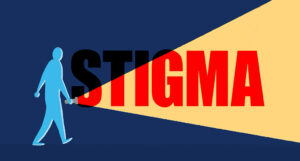We’re inspired and humbled to be working on some of the issues we’ve been tackling lately. From homelessness to fentanyl and from suicide to HIV – we’re involved with some of society’s pressing challenges. Some of its wicked problems.
Across this work, we’ve noticed a recurring theme. Stigma is a present and negative driving force in so many of the issues we help clients address. For example, when we look at HIV in rural communities and HIV in Black, urban communities, the experiences can be so different, but in both situations, stigma directly causes harm by driving people into hiding and away from the support they need. This extends to so many other critical areas including obesity and the hate targeted to LGBTQIA2S+ communities, as well as houselessness to suicide and the broader sphere of mental health. Stigma is a scourge that further oppresses and strains people’s lives. It makes people feel isolated and disconnected. It compromises access to the support and systems we all need to live healthy and fulfilling lives.
The one good thing about stigma? Almost all of us have experienced it at one level or another. Somewhere along the way, we’ve found ourselves on the outside. Feeling judged. Singled out or left out, it didn’t feel good. Ultimately, we can all agree it hurts and see how it holds us back. Most of us can make change where we may have contributed to it or allowed stigma to fester in the past.
 While I can’t say we’ve solved stigma, I can say we’re becoming adept at shining a light on it. Bringing it out into the open, so that communities can recognize it and ultimately disassemble the behaviors, systems and stereotypes that prop it up.
While I can’t say we’ve solved stigma, I can say we’re becoming adept at shining a light on it. Bringing it out into the open, so that communities can recognize it and ultimately disassemble the behaviors, systems and stereotypes that prop it up.
Given that somewhat shared experience, our team can then, through carefully crafted communications, reveal the burdens and constraints of old norms, creating recognition and empathy among many, while empowering those suffering the most to push past the of stigma to seek what they need – to heal and live their best life. These are some of the building blocks of change that is needed across several fronts of our society.
If you’ve got an issue where stigma is present, we’d be glad to talk about how we might address it together.